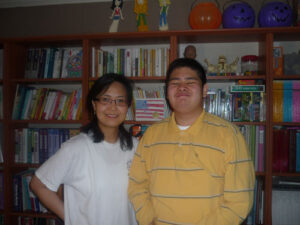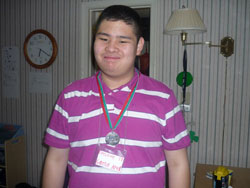By Taylor Valencia
UJW
STAFFORD, Va. — He doesn’t make eye contact with anyone sitting inches away from him. Slightly slumped and head leaned to the right, Alexander Juhna An stares at his lap, hands on his thighs.
You wouldn’t guess from his appearance but Alex is an athlete.

The 16-year-old swims, plays basketball and runs track for the Special Olympics.
And he excels. Gold and silver medals decorate his bedroom walls. He has earned one silver and two gold medals for basketball, and a silver medal for track.
That he’s autistic does not throw any salt on his game.
An estimated three to six kids out of every 1,000 will be burn autistic, according to the National Institutes of Health (NIH). Males are four times more likely than females to be autistic.
Autism is a developmental disorder that impairs social interaction, communication and intends to limit interests. Because of this, it can be hard to play a sport.
But not for Alex.
Sports helped bring him out of his shell.
“All he did was say, ‘Hi,’ and that’s it,” she said.
But after sports, An said her son became more outgoing and his interaction with others improved.
He likes watching movies, cartoons and drawing,” An said. “The computer is his strongest area. He’ll play a puzzle if asked.”
At home, Alex expresses himself through writing or pointing to images on a computer in the kitchen, such as food, games, places or anything else he wants.
He’s apparently so good with the computer that in elementary school he hacked into his teacher’s (a desktop) by figuring out her password, An said.
Alex also is a gentleman.
He brings in all the bags after shopping, helps with the dishes and keeps his room clean, An said, setting a good example for his sisters, Maerin, 12, and Maeyun, 10.

In school, he sometimes delivers a copy of The Freelance Star, the local newspaper, to Mary Catherine Hornung, who teaches English to 10th- graders. She lets her students give him a Hershey’s Kiss every time he arrives.
“It’s just a way of saying thank you. He’s always so happy when he brings the newspaper,” Hornung said.
Micki Feagans, Alex’s special-education teacher for the past year, was happy that he enrolled in the Special Olympics.
“I thought it was great. We were very excited for Alex,” she said.
Despite his progress, he is still struggling with some issues.
“He doesn’t like touching anyone,” An said. “In a game he just passes the ball to anyone” and it isn’t always to a teammate.
Despite these few obstacles, Alex will continue to play in the Special Olympics.
Like all mothers, An is hopeful for Alex. She wants people to accept him, and she envisions the day when he becomes independent.
“To live alone or in a group home with friends, that’s our plan,” An said.


